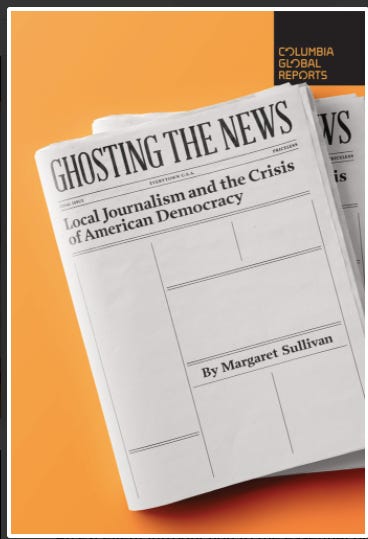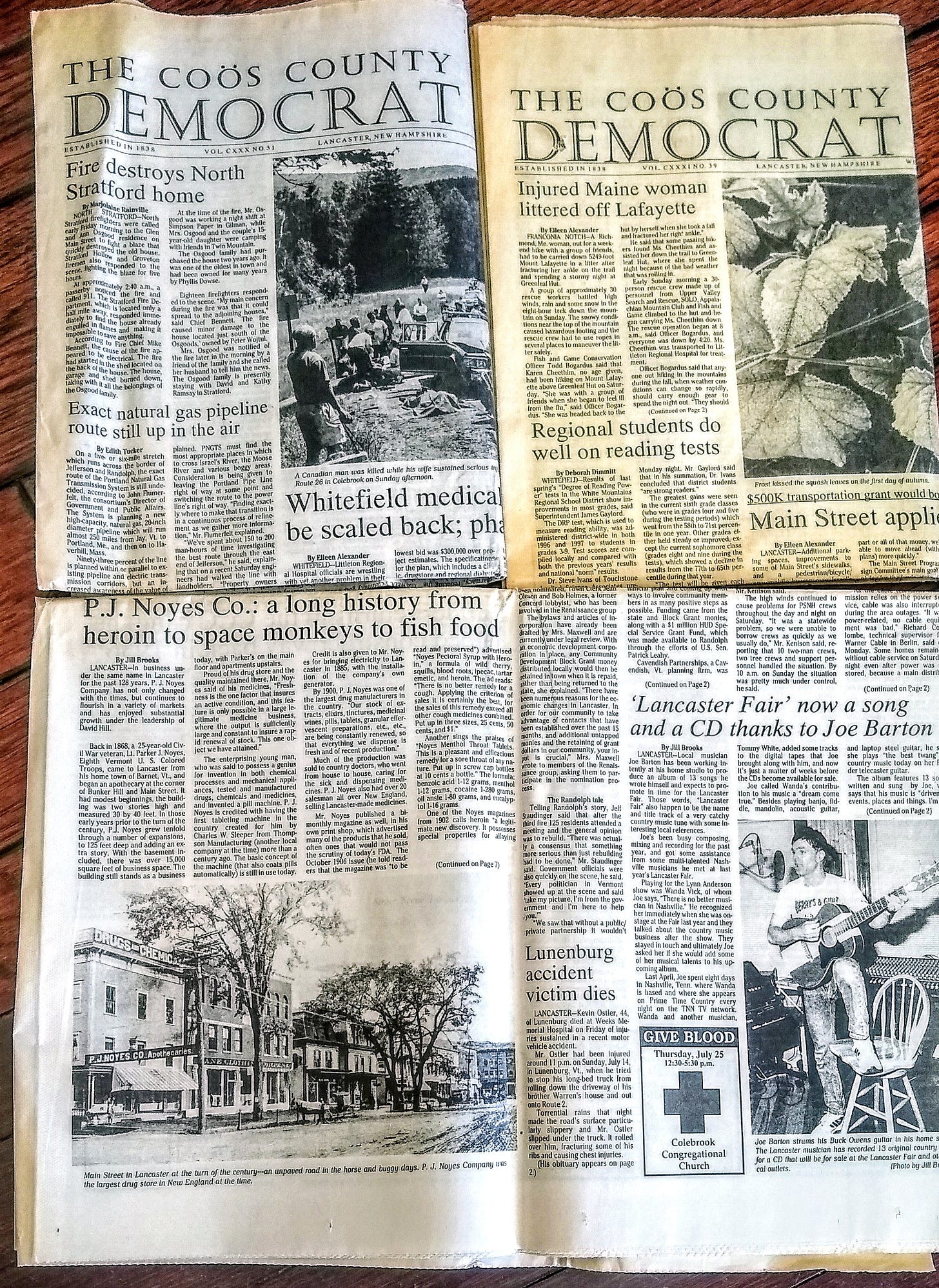“Journalism is what somebody doesn’t want you to know. The rest is advertising.” - Source Unknown
Before you read any further, may I ask - did you read your local paper — online or in actual print — this week? If not, did you get your news another way? Do I sound like a survey? I’m sorry. But I am curious, I really really want to know if you have a relationship with your local newspaper. Or even if you have a local newspaper.
Turns out an ever-increasing number of folks do not have a local paper or a source that regularly and reliably tells them what is going on in their communities and this is a more dangerous situation than I realized.
I wasn’t planning to go all alarm bells/news geek on you but on Thursday, I was standing at my kitchen counter eating a chicken sandwich and making my way through a print version of last Sunday’s Los Angeles Times (yes, I take all week to read it) when I read a review of Margaret Sullivan’s new book, “Ghosting The News: Local News and the Crisis of American Democracy.” I bought it right then and I’m racing through its 120 pages because what it’s telling me is urgent.

The book is not about so-called “fake news.” It is not, as Sullivan says in her introduction, about nostalgia for the old days. It is about the very real cost to us when we lose our local newspapers as so many of us have over the past ten to fifteen years.
Okay, this is somewhat personal for me. I was once a journalist. Not the high-profile Watergate kind who were our heroes when I went to school. I was a reporter for a paper called the Gloucester Daily Times and my beat was a town the size of a postcard: Rockport, Massachusetts (not Maine — important to all those who lump the three northernmost New England states together which is a story for another time).
I was more Columbo than Bernstein when I was a student of journalism at the University of New Hampshire in 1976. In fact, I was so clueless about what might be newsworthy and so reluctant to ask anyone an uncomfortable question, that three days before my first deadline in journalism class I still had nothing. Then, as I was folding underwear and baby clothes in the complex’s laundromat, my friend, the apartment manager, wandered in to switch her wash and felt sorry for me. She looked around and then said, “you didn’t hear this from me.” She told me the university was planning to close down the student counseling center without telling anyone “for budgetary reasons.” This was the closest I ever came to having a “deep throat” kind of source. I confirmed her info with a bunch of very surprised college administrators and then banged away at the IBM Selectric in my living room.
I brought the badly written piece to my professor who slashed it with a big red pen and then told me to submit it to the student paper. A few months and several stories later, the plan to close the center was abandoned. Students who needed and relied on the service would continue to receive it and we all got a lesson in how decisions could go when no one was looking and asking questions.
I didn’t really understand the true nature of this work until I got that first job covering Rockport, though. I discovered that nothing happening nationally is as important to people as that which is happening in their own backyards. Take the awful smells rolling from the sewage treatment plant across the yards of folks on one side of town — that was an ongoing story involving consultants, lawsuits, and lots of angry folks whose property abutted the treatment plant which could not be moved because Rockport is situated on a lot of rock on what is basically an island and there was no place else for it to go.

Photo: By joefrogger, CC BY-SA 3.0,
I knew less than nothing about sewage treatment or lawsuits or how towns made decisions but I found out. Fast. I took a tour of the plant. I sat in meetings of the Board of Selectman usually with only a few other citizens but because I was there, everyone in town learned what I learned — how the plant really worked, the various proposals, the costs, which Selectman voted for which proposal — all things that affected their taxes and their decisions when election time rolled around again.
This is not the kind of stuff CNN or even local radio or television will cover. Meetings of municipal officials rarely make for gripping theater and there were many times when I rolled my eyes so often I thought they would get stuck under my hairline. When reporters aren’t there, though, taxpayers lose. They lose big.
In her introduction, Sullivan tells of a 2018 study that shows municipal borrowing costs went up and government efficiency went down when a newspaper closed.
“Following a newspaper closure, municipal borrowing costs increase…costing the municipality and additional $650,000 per issue…Local newspapers hold their governments accountable, keeping municipal borrowing costs low and ultimately saving local taxpayers money.” - From Margaret Sullivan’s “Ghosting The News: Local News and the Crisis of American Democracy.”
But it’s not all government and budgets that make up a community, right? In addition to the Board of Selectman, the school, board and various other committee meetings, I covered the police, boat accidents, storm damage, the openings of the town’s art galleries, new businesses, that explosion that happened a block from my apartment during the ever-ending installation of sewer lines all over town, the school lunch menu, the Kindergarten Christmas program, the whale who occupied the Sandy Bay for a chunk of one summer forcing sailors to adjust their Sunday racing schedules, the retirement of the teacher everyone remembered fondly - or not. I took photographs of children, dogs, the town Christmas pageant. One sunny summer afternoon, I interviewed a woman about all the way to cook bluefish, and another I interviewed teh famous chef James Beard who is in town visiting a friend. If the coronavirus had happened back then, my job would be to report on how it affected Rockport and all its inhabitants and where to get what they need.
I knew people read the paper because they gave me their opinions whenever they felt like it, or suggested ideas about “what would make a good story.” I was part of the community, yet apart. Town politics did not break down along party lines but around the issues that touched everyone. They met on the pages of the paper and they talked about what they read there. They knew who to get mad at and it wasn’t “the media elites” to use the terminology of those who want to undermine the news sources we have left on the national stage.
When papers go away or shrink beyond recognition, all we have left are large media outlets and national news which leads not only to loss of money, less efficient government, and the loss of a common meeting ground, we are at the mercy of forces that want us to be and stay polarized:
“Voting becomes more politically polarized when local news fades, says a study published in 2018 in The Journal of Communication — citizens are less likely to vote a split ticket, choosing candidates from various political parties. Instead, relying on national sources of news, including cable news outlets, they are more likely to retreat into tribal corner, voting along strict party lines.” - Margaret Sullivan, “The Ghosting of The New: Local Journalism and The Crisis of American Democracy.”
The GDT still exists but it, like most newspapers large and small, it is not what it once was. There is no full-time reporter for an entire town. I don’t know what the circulation is or how the paper is doing. But the more that resources are bled from the papers, the few people tune in or subscribe and it becomes a death spiral. Has this happened where you are?
So, why am I writing about this today? Yes, there is a twinge of nostalgia for the old days but more than that I’m interested in how we can get back some of what we have lost. There are models out there, all kinds of people trying all kinds of things. Here in San Diego we have several local papers including the traditional San Diego Union Tribune now a sister paper to the LA Times thanks to new ownership and the Voice of San Diego, a not-for-profit online daily that has gotten national attention. In her book, Margaret Sullivan describes “news brigade” of 140 citizens of East Lansing, MI are making it their jobs to bring their community the news here in East Lansing Info. She talks about some ideas that can help here.
But the success of any new venture depends on readers, on demand. Is there enough do you think?
I want to ask you, my Spark community, and find out if I’m the only one who is thinking about this now or if you’ve thought about it and would like to know more about the kinds of things going on where you live. What is the name of your local paper or the paper you consider your local paper? Do you read it regularly? Do you miss it when you don’t see it? What does it offer you? Where does it fail you? If you don’t have a local paper, do you want one? How do you get your news these days? Or if all of this leaves you cold, just send me a link to one of the stories you found in your local paper over the past month that stood out for you or made you cry, laugh, shriek.
When I finish Sullivan’s book, I hope to have some more ideas about this. I’d like to hear yours. About this. About anything. Let’s talk.
Short Reads
A quick survey of local news from around the country showed me many papers doing a great job of making sure parents knew what to expect from school this year, the status of Covid-19 testing in local areas, many stories that took a look at the national news and asked “what does that mean for our community?”
Then there were these little jewels that sparkled from within the electronic pages as I clicked through them:
If This Old Pool Could Talk - Memories of an old salt water pool at the edge of the world in Ocean Beach, San Diego (OB Rag)
The loss of Orphan Annie’s - when an Idaho restaurant closes there is mourning — and a peek at the story behind it (Idaho Press “Local News Worth Holding”
Catching a comet from “Grandfather Mountain” - a photographer sets out to capture a comet with his camera on a North Carolina mountain
And here’s a fascinating front page in which virtually every story is local and relevant to its readers and reporters, the voluntary citizen journalists at East Lansing Info mentioned in Margaret Sullivan’s book “Ghosting The News: Local Journalism and The Crisis of American Democracy.”
Long Reads: E-Books and Deals

And before I climb down off my soapbox and go home, I want you to let you know about a novel to take with you on your Kindle to the beach - or wherever you can get to during this pandemic summer. T. Greenwood’s novel “Rust and Stardust” is available until midnight tonight for download at just $1.99. In this story, the child Sally Horner, kidnapped at 11 by a 52-year-old felon, finally gives a voice to the real girl who inspired the fictional one in Nabakov’s Lolita.
More e-book finds can be found here, including Pearl S. Buck, Toni Morrison, Annie Proulx, Jessie Redmon Fauset, and Isabelle Allende.
That’s it. Thank you. Let me know how you are and what you’re reading and don’t forget to browse here if you’re looking for a book. Every purchase supports local bookstores and literacy.
Be well. Keep your masks on. Stay safe.
Betsy
P.S. And now, your moment of Zen…the paper of my youth
Growing up I read the Coos County Democrat based in Lancaster, New Hampshire where the news was always local and contained, inside, the real news (who was visiting who, and whose anniversary it was) was (still is) covered by local citizens who were paid by the inch. It’s been years and several new owners since I’ve subscribed but I still keep copies around to remind me. One of my proudest moments was this interview with my hometown paper when my novel, “Casualties” was launched. I shared the page with a WWII vet, a student leader, some Easter eggs, and a flock of wild turkeys “out for a sunrise stroll” one morning.





Greg and I read the SD Tribune and feel strongly that we need to support our local paper or we will no longer have one. The headline doesn’t match the content most of the time and yet many people make judgements based on headlines only.
another test. I didn't have to sign in.